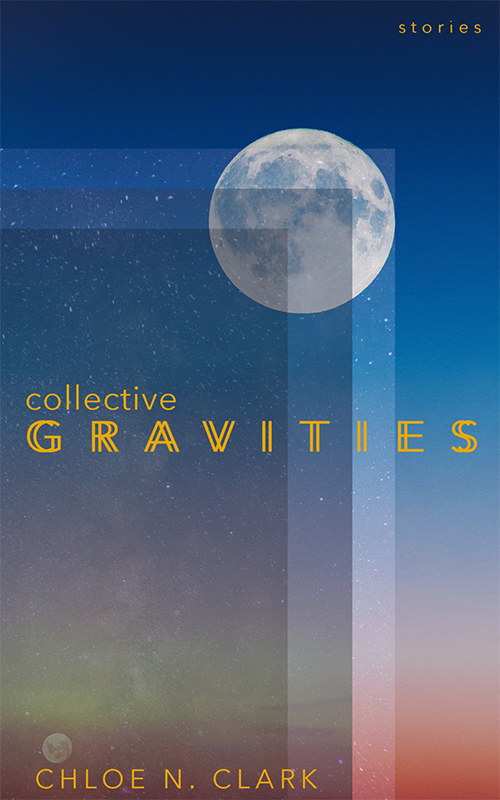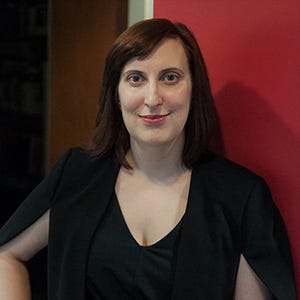“Place Nothing On Ground” — An Interview with Chloe N. Clark

Just like a mason laying a wall brick-by-brick, Chloe Clark has been building up an impressive oeuvre, regularly publishing fiction, poetry, and non-fiction all over the place. Now her wondrous and steady stream of stunning stories has coalesced in to her brilliant forthcoming collection, Collective Gravities, out in July 2020 from Word West Press.
Each of these stories reaches into our hearts while also reaching for the stars. Characters drag their past mistakes behind them like a zombie drags its feet. Through it all, Clark’s crisp words and honest exploration of the human heart keep us in thrall.
I chatted with her about her work in general and the collection in particular, covering everything from images and forms all the way to recipes and monsters.
Stephanie King: There is continuing discussion about constitutes the line between “literary” writing and “science fiction” or “horror.” One of the things [I love] about your stories is that you juxtapose those elements to synthesize something wholly unique. What makes domestic drama “literary” and how does such a story change when you, say, put an astronaut or zombies in it?
Chloe Clark: These are the stories that have always compelled me. I read a lot of domestic drama or what one might call literary fiction, but I’ve always loved it most when there is something else going on within that frame (Colson Whitehead and Kelly Link both do this masterfully).
To me, I find it really hard to distinguish between literary and other genres.
Life is strange, so it seems right to bring in the strange amongst everything else. In my mind, it makes sense that during a zombie apocalypse, you would mourn people you lost before it. So, there isn’t really room for science fiction or horror, to me, to not also be about the emotions of the everyday.
SK: How do you make the decisions to assemble the elements of a story? Does the character lead you to place them in a setting and context, or does the situation present itself and then you ask what human tribulation you can place within it? For example, in “Between the Axis and the Stars,” you have astronauts in a love triangle on a spacewalk, or in “Like the Desert Dark,” the protagonist mourns a daughter lost not just to death but a mirror door between dimensions.
CC: I recently read an article about people being shocked to find out that some people think pretty much exclusively in visuals whereas others have an ongoing internal monologue. It definitely surprised me, but the first thing I thought about was writing.
As someone who thinks in visuals, that’s how I write. I see a story playing out and then I verbalize it inside my head. And then I write it down. But I have to consciously verbalize those pictures. This means that a lot of times, once I’m actually writing the story, the whole thing has already coalesced in my mind. And often it’s hard to figure out what elements came together to create which part — the setting or the characters. That being said, all of my stories start with an image, usually one that kind of settles in my head for days (or sometimes years in the case of “Between the Axis and the Stars”). It might be a fully fleshed opening scene playing out or it might be a single image — for “Sometimes the Scenery is Beautiful,” it was a visual that didn’t even end up in the story: a sign at a recycling place that said “Place Nothing on Ground,” which struck me as a perfect metaphor for how one lives in the world.
SK: You write both shorter and longer fiction as well as poetry. When ideas and words start forming in your brain, how do you decide which format it’s going to come out as?
CC: Because of the way that I write, it’s often hard to talk about this process in particular, since a lot of it is gut instinct. But I’ll try (badly!) to put it into words.
I think a lot of times I let the story I’m trying to tell guide me — I think of poetry a lot as existing within a moment (even if the poem itself covers a span of a lifetime), while a story exists in the span of a conversation — a back and forth between myself and the characters. So, if the visuals I’m shaping into words feel like I can’t quite grasp them, that’s a poem. If they feel like I need to hear them out, that’s a story.
SK: How does your work as an editor — both for Cotton Xenomorph and freelance — influence the way you write? Do you switch between hats while you’re doing one or the other, or is the editor voice whispering in your ear as the words are coming out onto the page?
CC: I definitely think writing has made me a better editor and editing has made me a better writer. I don’t like to waste space in writing (this also what I yell angrily at 2+ hour films a lot — -WHERE IS YOUR EDITOR???!) and I don’t like to obscure what I’m trying to say.
I think abstraction and leaving things open to interpretation is wonderful, but I think it’s easy to just be confusing without a point, and I think good editing makes the difference. I definitely think picking up on those two things in other writers’ work, when I’m editing it, has made me much more consciously able to pick up on it in my own. So, I think they are constantly blended hats (a knit cap?).
That being said on first drafts, editor Chloe is probably a little more backseat, because I write very fast. So that probably comes in more while I’m editing and revising a piece to send out.
SK: You joked on Twitter about doing “a series of recipes that pair with the stories in [the] collection.” Can you talk a little bit about the importance of food, both to you as a writer and to your characters? And when can we expect the Collective Gravities Cookbook?
CC: I…am totally already working on that cookbook.
It’s quite fun to think about the stories in terms of the taste that comes to mind for me, when I was writing them and as I’m rereading them. Food is a very important part of my life (I dream in tastes even and make up recipes from the food I eat in dreams, so this goes deep). I grew up cooking and baking with my family, and now I do that as a de-stresser. If I’m doing a lot of grading, I probably have bread rising to knead between rounds of papers.
I think food connects us to each other, too, because we all have those tastes that draw us back to moments and places in our life. So, to me, it makes perfect sense that characters would focus on food in my stories. There’s a quote by Betty Fussell that I love: “Cooking connects every hearth fire to the sun and smokes out whatever gods there be — along with the ghosts of all our kitchens past, and all the people who have fed us with love and hate and fear and comfort, and whom we in turn have fed. A kitchen condenses the universe.”
SK: One of your academic interests is teaching monster theory, or put another way, the fear of the unknown. And yet, your stories aren’t about monsters but about relationships, not just romantic but between humans in general. In what way is the scariest unknown what lurks inside our own hearts?
CC: The unknown teaches us about ourselves in many ways. Monster Theory, and the way I look at it, is about exploring how fear is used to turn that which we don’t know into monsters. This often comes down to othering groups of people, because they are in some way outside of ourselves. But I think if we reflected that gaze back on ourselves, we’d be just as frightened. We can never really know our hearts (or we wouldn’t have regrets, right?). And those complications, that knowing, is extremely compelling.
I think a lot of writing is trying to figure out my world.

Chloe N. Clark holds an MFA in Creative Writing & Environment. She teaches multimodal composition, communication, and creative writing. Her poetry and fiction has appeared such places as Apex, Bombay Gin, Drunken Boat, Gamut, Hobart, Uncanny, and more. She writes columns for Nerds of a Feather, and can be found on Twitter @PintsNCupcakes. Her chapbook The Science of Unvanishing Objects was published by Finishing Line Press and her debut full length poetry collection, Your Strange Fortune, was published by Vegetarian Alcoholic Press. She has a poetry chapbook, Under My Tongue, forthcoming from Louisiana Literature Press and a short story collection, Collective Gravities, forthcoming from Word West. She is also founding co-editor-in-chief of Cotton Xenomorph.

Stephanie King is a past winner the Quarterly West Novella Prize and the Lilith Short Fiction Prize, with stories also appearing in Loch Raven Review, Lumen, Entropy, and Every Day Fiction. She received her MFA from Bennington College and serves on the board of the Philadelphia Writers’ Conference. You can find her online at stephanieking.net or @stephstephking on Twitter.
“Place Nothing On Ground” An Interview with Chloe N. Clark was originally published in Anomaly on Medium, where people are continuing the conversation by highlighting and responding to this story.
